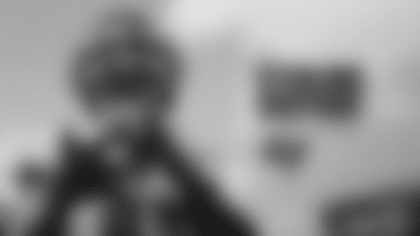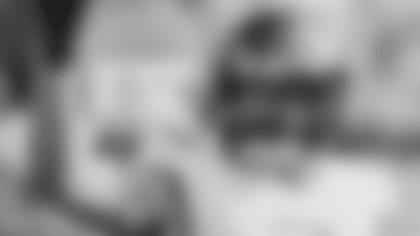When Dwayne Stukes first joined the Tampa Bay Buccaneers, right at the beginning of training camp in 2002, he was still trying to catch on as a defensive back in the NFL. He had spent some time with the Atlanta Falcons and Pittsburgh Steelers, as well as overseas with the Berlin Thunder of the now-defunct NFL Europe.
Rich Bisaccia was in the first year with the Buccaneers, too, as the team's special teams coach under new Head Coach Jon Gruden. Bisaccia had come up from the college ranks (Mississippi, Clemson, South Carolina, etc.) and he brought with him a fanatical attention to detail and a no-nonsense attitude. He also had a message for everybody that came under his purview: Special teams are absolutely critical.
Bisaccia stayed at the helm of the Bucs' special teams for nine seasons, before leaving for San Diego this offseason and turning that phase of the game over to Stukes. On Thursday evening, the Buccaneers held a special teams-only practice for the first time during their 2011 training camp, and Stukes had the same message for the new generation of Buccaneer hopefuls.
"Rich always said that we're going to start the game and we usually end the game – whether it's a field goal or a kickoff return or an onside kick," said Stukes at the end of a fast-paced field session that cycled quickly from one period to the next. "Whatever it may be, special teams is an integral part, and that's why he always used the term 'We-fense.' It's not offense, it's not defense, it's a combination of guys coming together and trying to build a unit. He always emphasized the little details, working on details to get better. And he always just talked about our unit staying strong and being one of the best in the NFL. That's what I took from him."
As a player, Stukes spent some time on the Bucs' practice squad in 2002 and then came back to training camp with the team in 2003. In 2006 he came back with a new mission, to break into coaching. He served as an assistant to the Bucs' coaches in 2006 and 2007, a low-profile role in which he helped out in any way he could, then became the quality control coach in 2008. For the past two seasons, he has served as the team's assistant defensive backs coach under Jimmy Lake. All the while, though, Stukes was paying a lot of attention to special teams, learning the intricate details from Bisaccia.
"I worked for Rich for six years," he said. "I know I was an assistant secondary coach for the last couple years but I never left my true home in the special teams. I learned a lot from Rich. The base, or the foundation, was already planted and now they're bringing guys back like the Spurlocks, the Haywards – core special teams players that are still going to be an integral part of our team."
The Bucs saw value in that continuity with Stukes, and as he says, they've done the same with some of their own free agents. Unrestricted free agent linebackers Adam Hayward and Quincy Black were re-signed, as were restricted free agents Connor Barth, Corey Lynch, Elbert Mack and Micheal Spurlock. All have been key members of the kick-and-return units in recent years, and the Bucs have fared very well in that phase of the game. Last year, for instance, Tampa Bay ranked eighth in the NFL in kickoff return average, eighth in opponent kickoff return average, seventh in opponent punt return average, second in opponent gross punting average and sixth in opponent net punting average. The Bucs also returned a kickoff for a touchdown in 2010, and in 2009 they returned one punt and one kickoff each for a score and blocked an amazing six kicks.
"It's very important," said Spurlock of the team-wide opinion of special teams. "For a lot of guys, this is how you make your bones around here. If you're not one of the 22 starters, this is another way you can keep a hat, and also keep a job. These are our starter reps for the special teams guys. It's fun to finally get out on the field. A lot of the young guys, you really have to hone in on them and let them know that there are only 22 spots that start, and this is another way to earn a job. Some buy in and some don't, so we'll see."
Spurlock points out what Stukes knew first as a player a decade ago: Buying into that belief that special teams are important can open doors for a young player.
"This is where we found Clifton Smith," he said. "Everyone shows up, and the Spurlocks of the world who weren't thought of as great receivers, per se – we know he's a great receiver and he's a good special teams player as well. [Preston Parker] showed his toughness on kickoffs [last year]. This is where you find out who has the heart to play special teams and not just want to play on offense or defense, and can help the team. Because that's what it's about – helping the team the best way you can."
**
Kick 'Em Deep
Despite all of that continuity, there was something seen on the Bucs' practice field on Thursday that hadn't been repeated since 1993.
It happened during the kickoff drill, when kicker Josh Jasper placed the tee on the 35-yard line. That's the result of a rule change this offseason that returned the spot of the kick to where it was before it was moved back five yards in 1994. The NFL made that change – and also limited the kickoff cover men to a five-yard running start – in order to reduce injuries. What it will definitely increase is touchbacks.
That was the Bucs' idea in signing former Atlanta punter Michael Koenen, who is also a kickoff specialist. Last year, Koenen tied for third in the NFL in touchbacks produced, with 23. Obviously, that was while kickoff off from the 30. Stukes was thrilled to get a player who can help his crew in more ways than one.
"Any time you can get a guy that kicks off and punts, you're basically getting two for one," he said. "Any time a guy is hitting touchbacks from the 30, and just imagine the ball's moved up to the 35 – hopefully we'll see the same thing we did in Atlanta, where he's kicking the ball out of the end zone, having touchbacks. We all know that field position is important in football and now it's going to be emphasized on punts and punt returns now that kickoffs have gone to the 35. Basically we got two-for-one. He's a good punter, has a lot of punts inside the 20-yard line, and we know what he does on kickoffs."
There is one strategic school of thought that says teams should use the closer kickoff spot to try to get a better result than the 20-yard line drive start that follows a touchback. With a shorter field to cover, a kicker and his cover men could conceivably kick it higher but a little shorter, force a return from inside the 10 and stop the return man closer to his own end zone.
Stukes says the Buccaneers will gladly take the gift of more touchbacks, and for one very good reason that doesn't show up in the score sheet.
"That's my absolute strategy," he said. "If I can save my kickoff team…I know we'll be running 40-yard sprints, but if he can kick it out of the end zone or into the end zone we'll be saving wear and tear on our guys' bodies so we'll last throughout the year. Then we can focus on the punt aspect and we can focus on the punt return aspect of it."
Koenen produced touchbacks on approximately a quarter of his kickoffs last year, and he hit it into the end zone 55.2% of the time. Presumably he'll be kicking it deeper in the end zone now, which will really discourage returns. Stukes expects that to happen, but doesn't want his cover men to get complacent.
"You can't tell the players that because they change their mentality," he said. "Once they start jogging down the field and the guy does bring it out, now they're shocked. Of course we expect touchbacks, but he could always have a mis-hit, the wind could blow, he could mess up his steps. There are a lot of factors that could cause a mis-hit, so I would never tell the guys to expect a touchback. But we paid him to kick touchbacks and we paid him to punt and that's what we want him to do."
**
Let Them Play!
It was an unusual afternoon for Spurlock, Koenen, Barth and several others. As players who had signed new contracts after the new CBA took effect a week-and-a-half ago, they could not actually join their team in practice until that deal was ratified by the reformed NFLPA. That didn't take place until late in the afternoon on Thursday, and Spurlock and company were left killing time until they found out.
"It's like a kid and your momma's letting you go outside," said Spurlock of finally getting the go-ahead just as practice was starting. "We've been on the sideline for a couple of days just watching practice. You see other guys make plays and you watch film of other guys, and finally you get to see yourself. It's a good feeling to be back among your guys. We were locked out a little longer than everyone else, so it was just fun to get out, run around and do what you love once again."
The delay made Spurlock think about all the hurdles he has cleared during his career, trying to make it out onto the field in the NFL.
"That's kind of how I stick around," he said with a laugh. "We were in the locker room wondering, 'Are we ratified yet? Can we go practice? No? Yes?" Mark [Dominik] came through and said, 'Okay, you're good, we're clear.'"
Spurlock is looking forward to Friday afternoon, when he'll finally be able to join the competition at wide receiver. And the Bucs will finally have a full complement of players in practice when they take the field at 2:30 p.m. ET. Among the men getting their first work of the season on offense and defense will be guard Davin Joseph and tackles Jeremy Trueblood and James Lee.


































